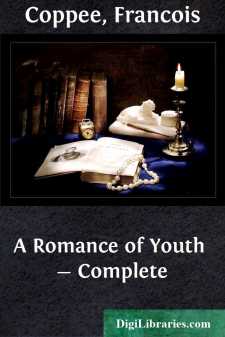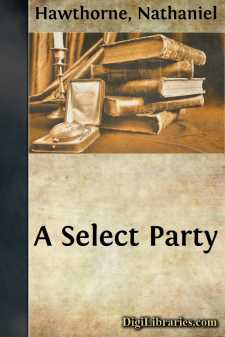Fiction
- Action & Adventure 182
- Biographical 15
- Christian 59
- Classics
- Coming of Age 4
- Contemporary Women 1
- Erotica 9
- Espionage/Intrigue 12
- Fairy Tales, Folklore & Mythology 235
- Family Life 169
- Fantasy 117
- Gay 1
- General 596
- Ghost 32
- Historical 808
- Horror 42
- Humorous 160
- Jewish 25
- Legal 4
- Medical 22
- Mystery & Detective 314
- Political 49
- Psychological 41
- Religious 64
- Romance 158
- Sagas 11
- Science Fiction 730
- Sea Stories 113
- Short Stories (single author) 537
- Sports 10
- Suspense 1
- Technological 8
- Thrillers 2
- Urban Life 29
- Visionary & Metaphysical 1
- War & Military 173
- Westerns 199
Classics Books
Sort by:
by:
Francois Coppee
FRANCOIS COPPEE FRANCOIS EDOUARD JOACHIM COPPEE was born in Paris, January 12, 1842. His father was a minor 'employe' in the French War Office; and, as the family consisted of six the parents, three daughters, and a son (the subject of this essay)—the early years of the poet were not spent in great luxury. After the father's death, the young man himself entered the governmental office...
more...
Chapter I: The Bertolini "The Signora had no business to do it," said Miss Bartlett, "no business at all. She promised us south rooms with a view close together, instead of which here are north rooms, looking into a courtyard, and a long way apart. Oh, Lucy!" "And a Cockney, besides!" said Lucy, who had been further saddened by the Signora's unexpected accent. "It might...
more...
CHAPTER I. THE WILD ROSE IS THE SWEETEST. I tell again the oldest and the newest story of all the world,—the story of Invincible Love! This tale divine—ancient as the beginning of things, fresh and young as the passing hour—has forms and names various as humanity. The story of Aspatria Anneys is but one of these,—one leaf from all the roses in the world, one note of all its myriad of songs....
more...
by:
George MacDonald
Chapter I. How I Came to know Clare Skymer. It was a day when everything around seemed almost perfect: everything does, now and then, come nearly right for a moment or two, preparatory to coming all right for good at the last. It was the third week in June. The great furnace was glowing and shining in full force, driving the ship of our life at her best speed through the ocean of space. For on deck,...
more...
by:
Bertram Mitford
Chapter One. The Sheep-Stealers. The sun flamed down from a cloudless sky upon the green and gold of the wide valley, hot and sensuous in the early afternoon. The joyous piping of sheeny spreeuws mingled with the crowing of cock koorhans concealed amid the grass, or noisily taking to flight to fuss up half a dozen others in the process. Mingled, too, with all this, came the swirl of the red, turgid...
more...
by:
Robert Dodsley
TO HIS LOVING FRIEND THE AUTHOR, UPON HIS TRAGEDY "THE REBELLION."To praise thee, friend, and show the reason why,Issues from honest love, not flattery.My will is not to flatter, nor for spiteTo praise or dispraise, but to do thee rightProud daring rebels in their impious wayOf Machiavellian darkness this thy playExactly shows; speaks thee truth's satirist,Rebellion's foe, time's...
more...
by:
Various
INTRODUCTION. It appears from William Webbe's Epistle prefixed to this piece, that after its first exhibition it was laid aside, and at some distance of time was new-written by R. Wilmot. The reader, therefore, may not be displeased with a specimen of it in its original dress. It is here given from the fragment of an ancient MS. taken out of a chest of papers formerly belonging to Mr Powell,...
more...
by:
Various
ACT I., SCENE I. The Exchange. Enter YOUNG MASTER ARTHUR and YOUNG MASTER LUSAM. Y. ART. I tell you true, sir; but to every manI would not be so lavish of my speech:Only to you, my dear and private friend,Although my wife in every eye be heldOf beauty and of grace sufficient,Of honest birth and good behaviour,Able to win the strongest thoughts to her,Yet, in my mind, I hold her the most hatedAnd...
more...
The man of fancy made an entertainment at one of his castles in the air, and invited a select number of distinguished personages to favor him with their presence. The mansion, though less splendid than many that have been situated in the same region, was nevertheless of a magnificence such as is seldom witnessed by those acquainted only with terrestrial architecture. Its strong foundations and massive...
more...
by:
Epictetus
A SELECTION FROM THE DISCOURSES OF EPICTETUS. OF THE THINGS WHICH ARE IN OUR POWER AND NOT IN OUR POWER.—Of all the faculties (except that which I shall soon mention), you will find not one which is capable of contemplating itself, and, consequently, not capable either of approving or disapproving. How far does the grammatic art possess the contemplating power? As far as forming a judgment about what...
more...











